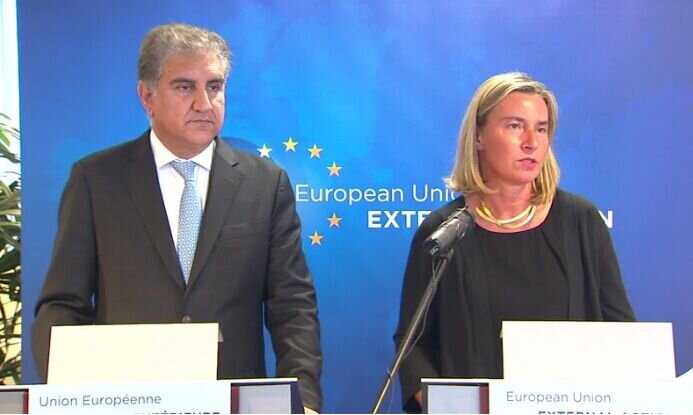Mogherini says INSTEX ready to be operational

European Union foreign policy chief Federica Mogherini said on Tuesday that INSTEX, a special purpose vehicle aimed at facilitating legitimate trade between European economic operators and Iran, is now ready to be operational.
“You will probably hear more from us in the coming days but, as you know, we have been working a lot with our member states to put in place these mechanisms that allow legitimate trade with Iran to continue. I believe that this is now ready to be operational and I hope that this is something that can help to keep Iran compliant with the agreement, as it has been so far and as we all want to see this continue to be the case,” Mogherini said during a joint press conference with Pakistani Foreign Minister Shah Mahmood Qureshi in Brussels.
According to the official website of the European Union, she added, “As I already had the opportunity to say before, the deal has, in itself, mechanisms and steps that can be taken in case of non-compliance with the agreement. But the focus we keep today and we will still keep even more so in these days that are probably the most difficult ones for the agreement, is to keep the agreement in place and to keep full compliance with the agreement.”
On January 31, France, Germany and Britain, the three European parties to the JCPOA, announced the creation of INSTEX.
INSTEX was announced nearly nine month after the Trump administration withdrew from the JCPOA and reimposed sanctions on Iran.
The U.S. exited the deal on May 8, 2018.
Even since its introduction on January 31, it has not become operational yet.
On March 20, Iran’s central bank governor Abdolnaser Hemmati announced that a mechanism similar to INSTEX has been registered in Iran, officially called the Special Trade and Finance Institute (STFI).
During a joint press conference with Foreign Minister Mohammad Javad Zarif in Tehran on June 10, German Foreign Minister Heiko Maas said, “We make efforts to make it possible to have economic cooperation with Iran. A financial mechanism called INSTEX has been devised in this respect.”
Kamal Kharrazi, chief of the Strategic Council on Foreign Relations, said on Sunday that the Europeans should dedicate more resources to INTEX and facilitate Iran-Europe interaction.
“We should see if Europe just gives promises or takes practical actions in the remaining time,” Kharrazi told reporters after a meeting with British Minister of State for the Middle East Andrew Murrison.
On May 8, Iran announced a partial withdrawal from some aspects of the nuclear pact, saying that the country would no longer adhere to some of the limits on its nuclear activities. It also threatened to step up uranium enrichment if an agreement is not made within 60 days to protect it from the sanctions’ effects. The deadline ends on July 7.
Kharrazi also said Iran is serious about decisions related to the 2015 nuclear deal and will take new steps after the 60-day deadline.
In line with Tehran’s decision to scale back its commitments under the nuclear deal in protest to reimposition of sanctions, the Atomic Energy Organization of Iran (AEOI) announced on June 17 that Iran’s stockpile of enriched uranium will exceed 300 kilograms by June 27.
After June 27, Kamalvandi said, Iran will speed up its uranium enrichment activities beyond 3.67 percent if the other sides don’t take a practical step.
“After surpassing 300 kilogram, we will increase the speed of producing enriched uranium above 3.67 percent,” Kamalvandi stated.
Iran has insisted it will reverse its decision if it is shielded from sanctions.
The 60-day deadline will end on July 7.
NA/PA
